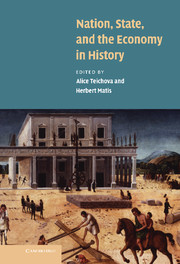Book contents
- Frontmatter
- Contents
- List of figures
- List of tables
- List of contributors
- Acknowledgements
- Introduction
- PART I
- PART II
- PART III
- 12 Nation without a state and state without a nation: the case of Africa south of the Sahara
- 13 The economic foundation of the nation-state in Senegal
- 14 From the Jewish national home to the state of Israel: some economic aspects of nation and state building
- PART IV
- PART V
- Index
12 - Nation without a state and state without a nation: the case of Africa south of the Sahara
Published online by Cambridge University Press: 07 September 2009
- Frontmatter
- Contents
- List of figures
- List of tables
- List of contributors
- Acknowledgements
- Introduction
- PART I
- PART II
- PART III
- 12 Nation without a state and state without a nation: the case of Africa south of the Sahara
- 13 The economic foundation of the nation-state in Senegal
- 14 From the Jewish national home to the state of Israel: some economic aspects of nation and state building
- PART IV
- PART V
- Index
Summary
There exist nations with states, and nations without a state. In Africa south of the Sahara, we sometimes have to face another case: states without nations. This of course implies that first a definition be proposed as regards what is a state, and what is a nation. The question is on the agenda for the African continent; today a large literature exists on the topic in and on Africa. Let us say, to oversimplify, that hypothetically, exactly as anywhere else in the world, also in Africa:
a state may be defined by its political sovereignty, its territory and state apparatus;
a nation is a combination of various factors: a common cultural and therefore historical and often linguistic past (as is the case in Europe for Germans), but also a community built on freely recognised institutions, as for example in France those institutions inherited from the French Revolution of 1789, as well as the modern democratic model.
The hypothesis here is that, before independence in Africa – more or less before the 1960s which is very recent indeed – the economy played an important, if not a major part in the making not only of pre-colonial political entities, states and even nations, but also of colonial territories. Therefore, as colonies were to give birth to independent states, these inherited economic forms were decisive and still heavily weigh on the Africa of today.
- Type
- Chapter
- Information
- Nation, State and the Economy in History , pp. 239 - 250Publisher: Cambridge University PressPrint publication year: 2003
- 1
- Cited by



